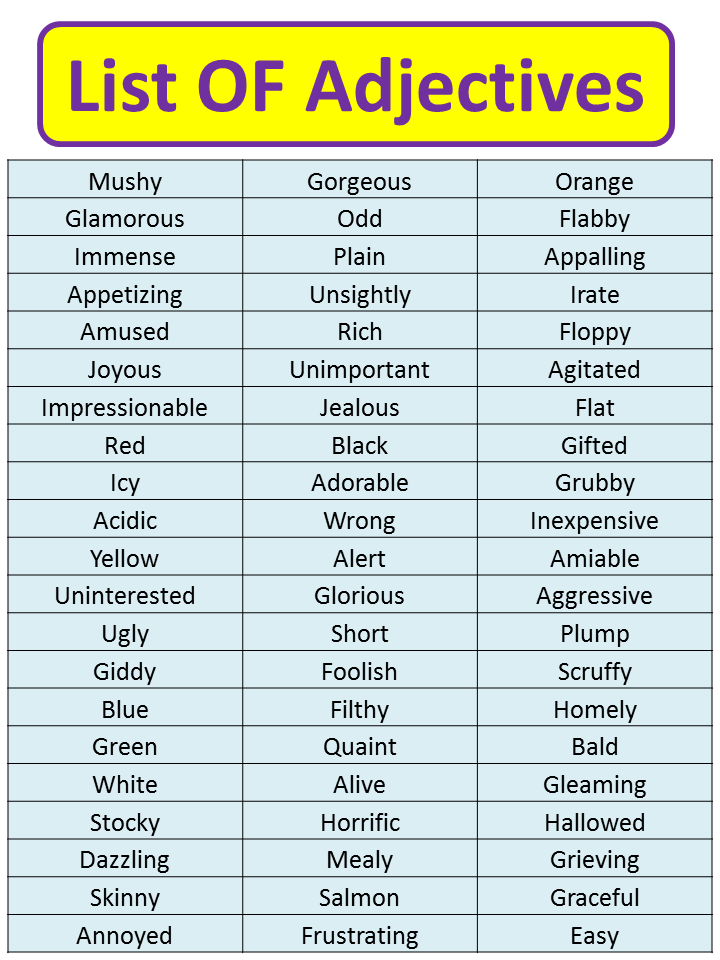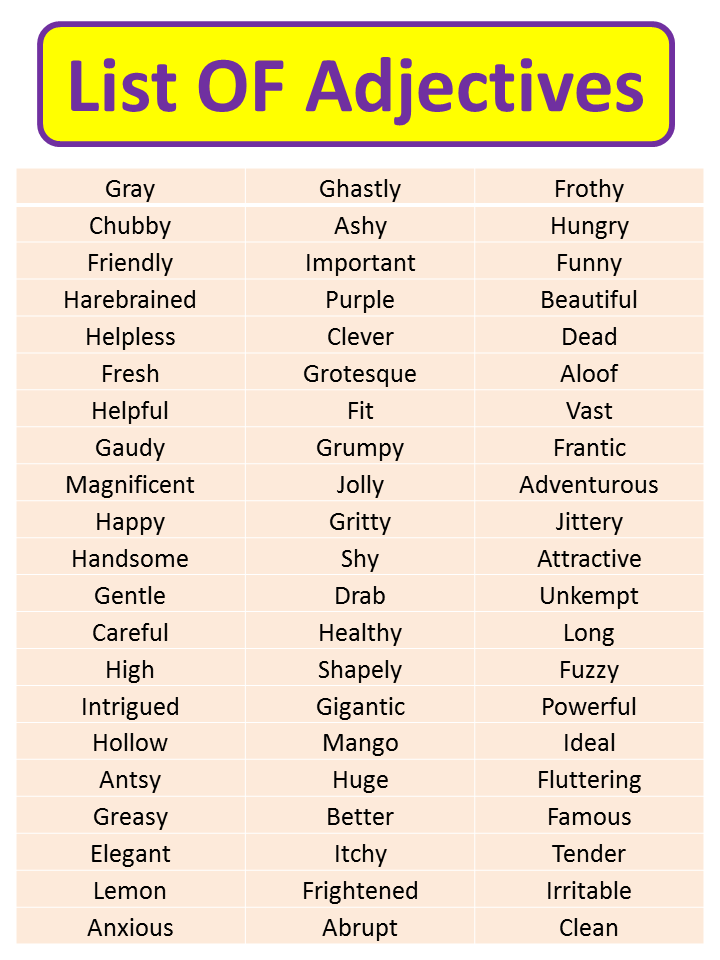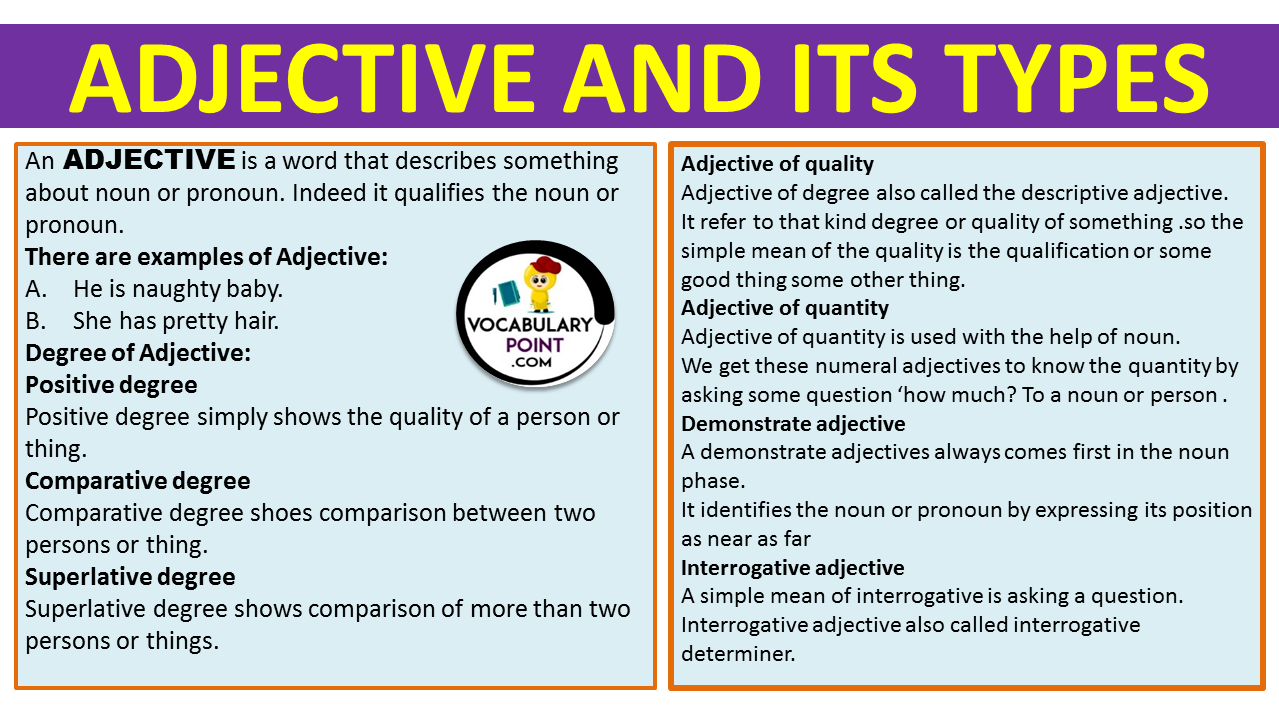When we describe the world around us, we often rely on adjectives to add color, depth, and emotion to our language. From the vibrant fiery and soothing serene to the mysterious enigmatic, adjectives play a crucial role in shaping our perceptions and interpretations of the world.
In this article, we will explore the fascinating world of adjectives and their types, uncovering how these versatile words enrich our everyday communication and contribute to the vivid tapestry of human expression.
Adjective and Its Types
Definition of Adjective:
An adjective is a part of speech that modifies or describes a noun or pronoun, providing more information about it. Adjectives typically answer questions like “what kind,” “how many,” or “which one.”
Types of Adjectives:
Qualitative Adjectives (Descriptive):
Definition: Qualitative adjectives describe qualities or states of the noun. They offer subjective assessments.
Examples:
- Huge elephant
- Happy child
- Gloomy weather
- Delicious food
- Ancient monument
Sentences:
- The gigantic tree towered over the houses.
- She felt unbelievably
- The scarlet dress was eye-catching.
- A mysterious sound echoed in the hall.
- He has an inventive
Quantitative Adjectives:
Definition: Quantitative adjectives indicate an amount or quantity.
Examples:
- Many books
- Few people
- Several options
- Numerous stars
- Some water
Sentences:
- There are twenty students in my class.
- She had three
- He read several
- They spent countless hours practicing.
- I need more
Demonstrative Adjectives:
Definition: Demonstrative adjectives point out specific nouns.
Examples:
- This book
- That idea
- These cookies
- Those cars
- Such a mistake
Sentences:
- This song is my favorite.
- Those flowers are beautiful.
- That decision was crucial.
- He didn’t expect such a reaction.
- These chocolates are delicious.
Possessive Adjectives:
Definition: Possessive adjectives show ownership or possession.
Examples:
- My book
- Your house
- His car
- Her idea
- Our country
Sentences:
- My phone is new.
- Their garden is lovely.
- Her dress is elegant.
- Your answer is correct.
- Our team won the match.
Must Learn About:
Nouns, Pronouns, Verbs, Adjectives, Adverbs, Interjections, Prepositions, Conjunctions
Interrogative Adjectives:
Definition: Interrogative adjectives are used in questions.
Examples:
-
- What time
- Which route
- Whose book
Sentences:
-
- What day is it?
- Which way should we go?
- Whose shoes are these?
- What kind of movie do you like?
- Which dress do you prefer?
Distributive Adjectives
Definition: Distributive adjectives refer to individual members of a group or class. They are used to describe specific members taken one at a time.
Examples:
- Each
- Every
- Either
- Neither
- Any
Sentences:
- Each student had a different opinion.
- Every apple in the basket was ripe.
- You can choose either
- Neither option seemed appealing.
- She could play any
- Each book on the shelf is interesting.
- Every bird in the sky flew south.
- He could join either
- Neither brother wanted to leave.
- Is there any sugar left?
Indefinite Adjectives
Definition: Indefinite adjectives describe nouns in a vague or non-specific manner. They don’t give an exact amount or number.
Examples:
- Many
- Few
- Some
- Several
- Any
Sentences:
- Many people attended the concert.
- Only a few guests stayed late.
- She had some interesting ideas.
- Several birds were singing.
- Any student can join the club.
- Many stars were visible in the sky.
- A few apples fell from the tree.
- He found some old coins in the attic.
- Several friends came to her aid.
- Any book on this shelf is good.
Comparative Adjectives
Definition: Comparative adjectives are used to compare differences between the two objects they modify. They are used in sentences where two nouns are compared.
Examples:
- Bigger
- Smarter
- Faster
- Higher
- Stronger
Sentences:
- This box is bigger than that one.
- She is smarter than her brother.
- He runs faster than me.
- The mountain is higher than the hill.
- She is stronger than she looks.
- My car is faster than yours.
- This coffee is stronger than usual.
- The river is wider
- He is taller than his father.
- This book is more interesting than the other.
Superlative Adjectives
Definition: Superlative adjectives are used to describe an object which is at the upper or lower limit of a quality. They are used in sentences where a subject is compared to a group of objects.
Examples:
- Tallest
- Smartest
- Fastest
- Strongest
- Best
Sentences:
- He is the tallest in the class.
- She is the smartest
- This is the fastest car available.
- He is the strongest man in the tournament.
- This is the best cake I’ve ever had.
- She wore her nicest
- This is the highest mountain in the world.
- He is the funniest
- That was the worst storm we’ve had.
- She is the kindest person I know.
Proper Adjectives
Definition: Proper adjectives are derived from proper nouns. They usually describe something in relation to a specific person, place, or thing.
Examples:
- American
- Shakespearean
- Victorian
- Freudian
- Orwellian
Sentences:
- He loves American
- She enjoys reading Shakespearean
- The house had a Victorian
- His theory has a Freudian
- The story had an Orwellian
- They sell Italian
- She wore a Parisian
- He specializes in African
- The recipe is Mexican.
- She admires Elizabethan
Compound Adjectives
Definition: Compound adjectives are formed when two or more words are combined to create an adjective. Often, they are hyphenated.
Examples:
- High-quality
- Long-term
- Easy-going
- Well-known
- Middle-aged
Sentences:
- She bought a high-quality
- It’s a long-term
- He is known for being easy-going.
- The well-known author signed books.
- A middle-aged man walked by.
- She wore a light-blue
- It was a heart-warming
- He had a short-term
- The well-dressed gentleman entered.
- She found a full-time
Predicate Adjectives
Definition: Predicate adjectives follow a linking verb and describe the subject of the sentence. They are not placed directly before the noun.
Examples:
- Happy
- Tired
- Beautiful
- Cold
- Excited
Sentences:
- The children are happy.
- She seems tired
- The view is beautiful.
- The weather feels cold.
- They are excited about the trip.
- He was angry.
- The soup tasted delicious.
- The movie was interesting.
- She appeared nervous.
- The dog looked hungry.
Attributive Adjectives
Definition: Attributive adjectives are placed directly before the noun they modify and are part of the noun phrase. They describe qualities or states of being.
Examples:
- Blue
- Tall
- Funny
- Bright
- Heavy
Sentences:
- The blue sky was cloudless.
- A tall building stood nearby.
- He told a funny
- She has bright
- The heavy box was hard to lift.
- A small cat walked by.
- She wore a red
- He drove a fast
- They live in a big
- She picked a fresh
Nominal Adjectives
Definition: Nominal adjectives are adjectives that function as nouns. They often represent a group described by the adjective.
Examples:
- Rich
- Poor
- Elderly
- Homeless
- Unemployed
Sentences:
- The rich have different problems.
- Help is needed for the poor.
- The elderly need special care.
- Shelters support the homeless.
- Programs assist the unemployed.
- The young often seek change.
- The sick were treated first.
- The wealthy donated generously.
- The educated have more opportunities.
- The brave are celebrated.
Participial Adjectives
Definition: Participial adjectives are formed from verbs but function as adjectives. They are usually present or past participles.
Examples:
- Boring
- Excited
- Tiring
- Amused
- Frightened
Sentences:
- The lecture was boring.
- She felt excited about the news.
- The journey was tiring.
- He looked amused by the joke.
- The movie was frightening.
- The book is interesting.
- The task was challenging.
- She was annoyed by the noise.
- The story was touching.
- He was surprised by the gift.
30 Examples of Adjectives in Sentences:
- The blue sky was cloudless.
- She was extremely excited for the trip.
- The old mansion looked eerie.
- His funny joke made everyone laugh.
- The fast train arrived on time.
- It was a beautiful
- The bitter coffee needed sugar.
- She wore a sparkling
- The soft pillow felt comfortable.
- He is a brilliant
- The dark room was scary.
- A noisy crowd gathered.
- The green grass shimmered in the sun.
- They lived in a quiet
- Her friendly smile was welcoming.
- The icy road was slippery.
- The tall building dominated the skyline.
- She has a creative
- The salty sea breeze was refreshing.
- It was an unforgettable
- A small bird chirped happily.
- The warm soup was comforting.
- He felt utterly
- The crimson sunset was breathtaking.
- A gentle breeze cooled the air.
- The loud music was exhilarating.
- She has curly
- The chilly night called for a fire.
- His keen observation solved the mystery.
- The ripe fruit was juicy.
Download PDF
Adjective and its Types with Examples | Images
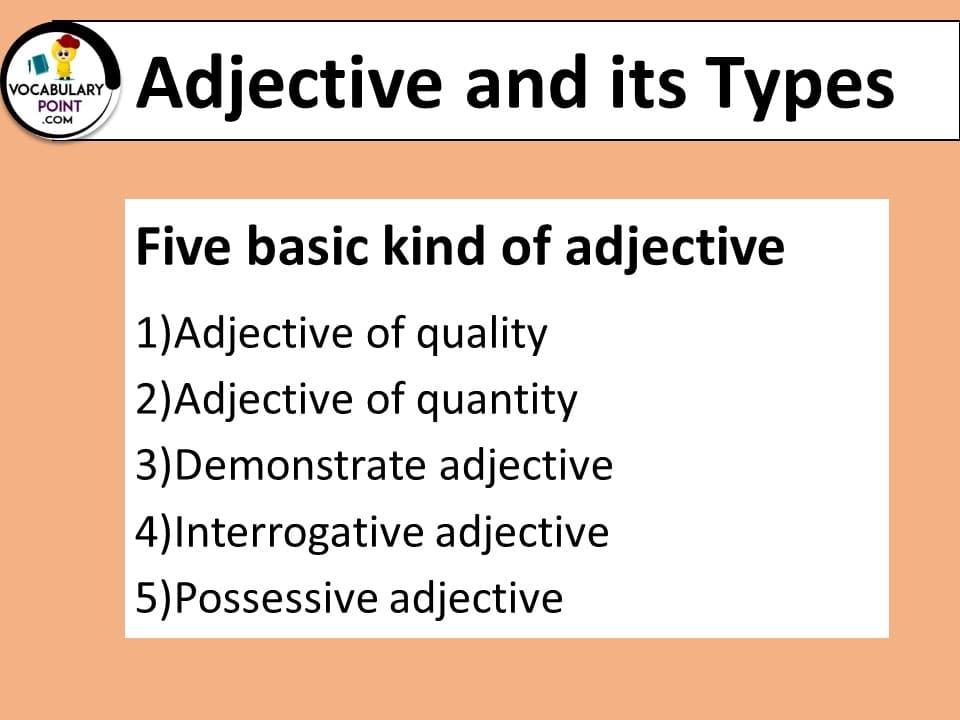
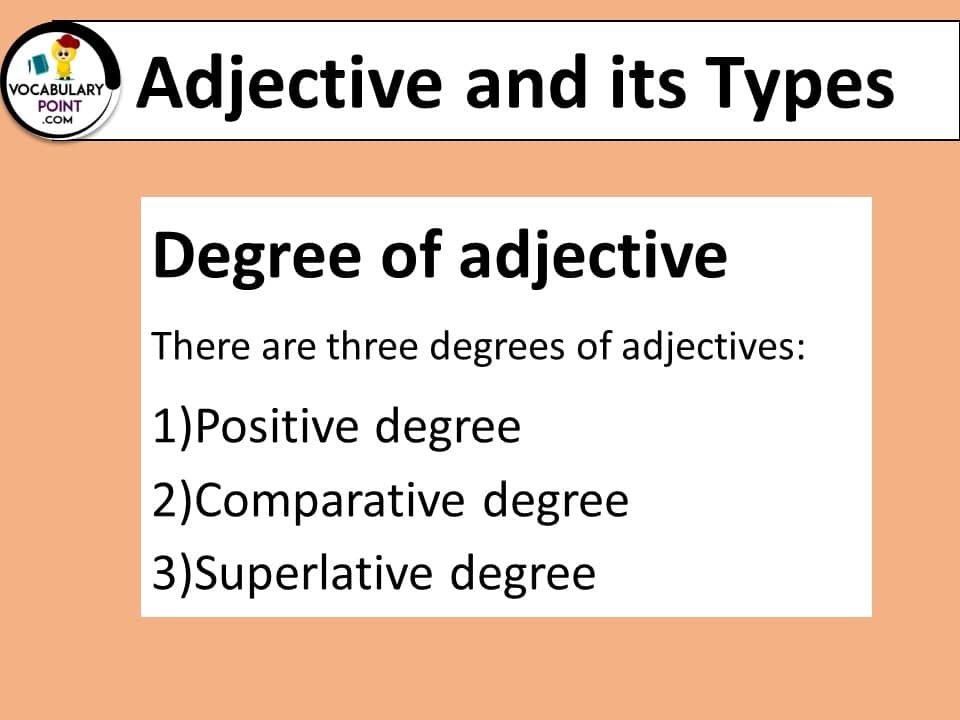
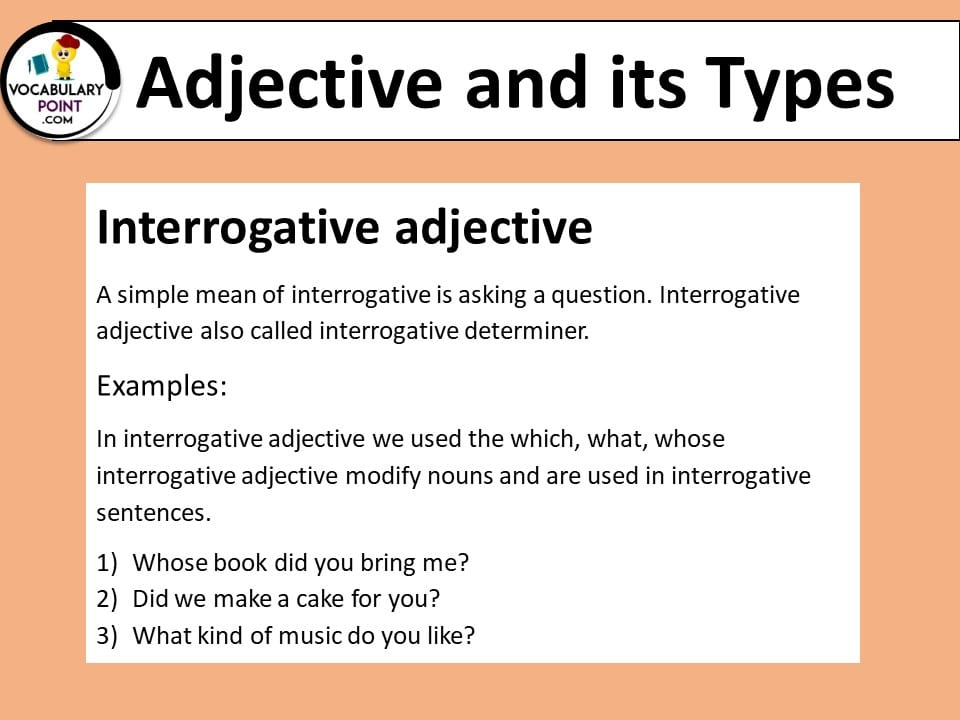
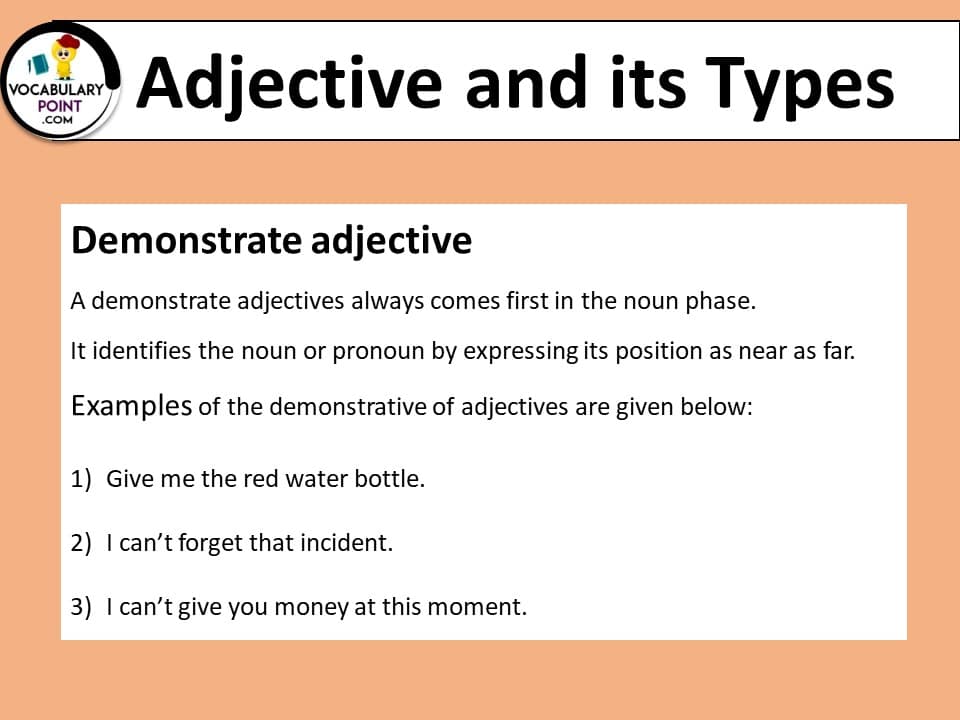
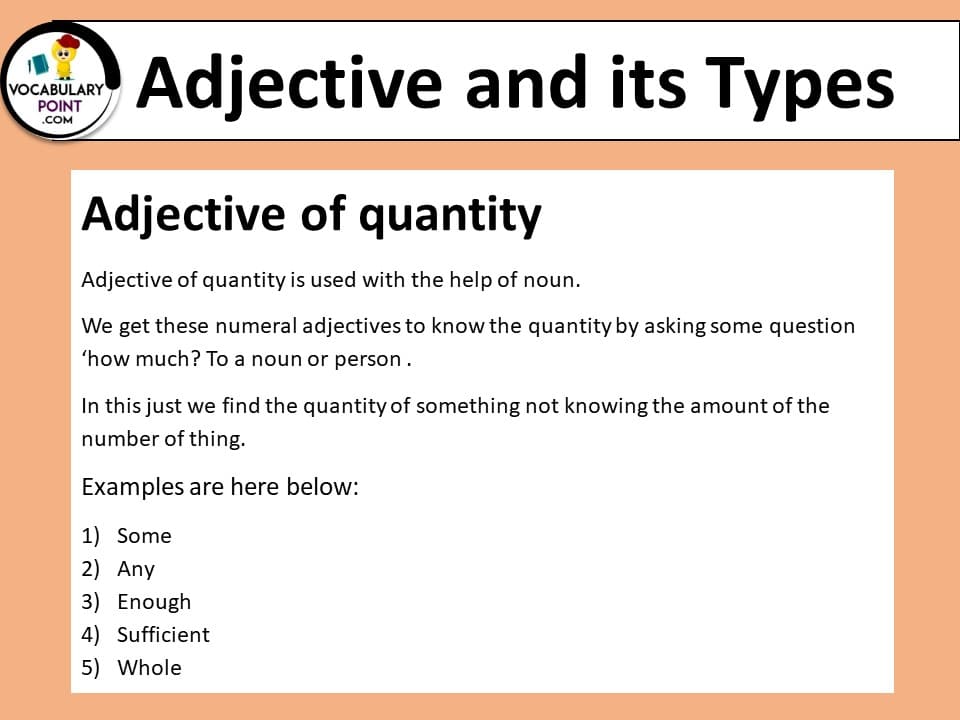
List Of Adjectives
|
Abundant |
Acclaimed |
Accomplished |
|
Accurate |
Aching |
Acrobatic |
|
Active |
Actual |
Adaptable |
|
Adequate |
Admirable |
Admired |
|
Adolescent |
Adorable |
Adored |
|
Advanced |
Adventurous |
Affectionate |
|
Afraid |
Agile |
Agitated |
|
Agonizing |
Agreeable |
Ajar |
|
Alert |
Alienated |
Alive |
|
All |
Altruistic |
Amazing |
|
Ambitious |
Ample |
Amused |
|
Amusing |
Anchored |
Ancient |
|
Angelic |
Angry |
Anguished |
|
Animated |
Annual |
Another |
|
Antique |
Anxious |
Any |
|
Apprehensive |
Appropriate |
Apt |
|
Ardent |
Arid |
Aromatic |
|
Artistic |
Ashamed |
Aspiring |
|
Assured |
Astonishing |
Athletic |
|
Attached |
Attentive |
Attractive |
|
Austere |
Authentic |
Authorized |
|
Automatic |
Avaricious |
Average |
|
Aware |
Awesome |
Awful |
|
Awkward |
Babyish |
Bad |
|
Baggy |
Bare |
Barren |
|
Basic |
Beautiful |
Belated |
|
Beloved |
Beneficial |
Best |
|
Better |
Bewitched |
Big |
|
Big-Hearted |
Biodegradable |
Bite-Sized |
|
Bitter |
Black |
Bland |
|
Blank |
Blaring |
Bleak |
|
Blind |
Blissful |
Blond |
|
Blue |
Blushing |
Bogus |
|
Boiling |
Bold |
Bony |
|
Boring |
Bossy |
Both |
|
Bouncy |
Bountiful |
Bowed |
|
Brave |
Breakable |
Brief |
|
Bright |
Brilliant |
Brisk |
|
Broken |
Bronze |
Brown |
|
Bruised |
Bulky |
|
|
Bumpy |
Buoyant |
Burdensome |
|
Burly |
Bustling |
Busy |
|
Buttery |
Buzzing |
Calculating |
|
Calm |
Candid |
Canine |
|
Capital |
Carefree |
Careful |
|
Careless |
Caring |
Cautious |
|
Celebrated |
Charming |
Cheap |
|
Cheerful |
Cheery |
Chief |
|
Chilly |
Chubby |
Circular |
|
Classic |
Clean |
Clear |
Must Learn: List Of Adjectives A to Z
